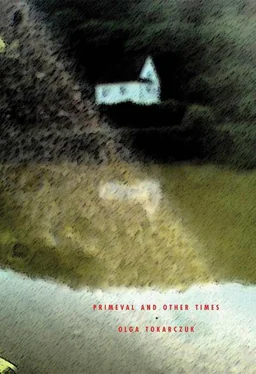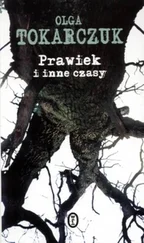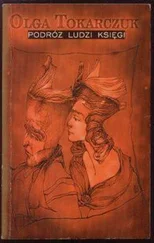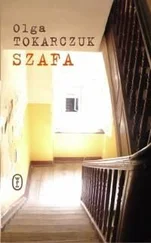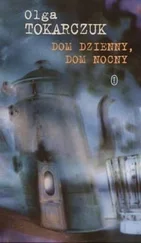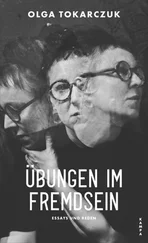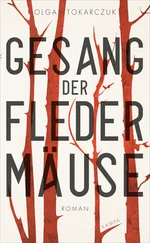Ukleja came home late. As he stood on the threshold in a fur coat sprinkled in snow, Ruta instantly knew he was drunk. He didn’t like the smell of cardamom and he didn’t like the stew.
“Why didn’t you make beetroot soup and ravioli? It’s Christmas Eve!” he screamed. “You only know how to screw. You don’t care who you do it with, whether it’s Russkies or Germans or that halfwit Izydor. That’s all you’ve got in your head, you bitch!”
He shakily went up to her and hit her in the face. She fell down. He knelt beside her and tried to get inside her, but his flaccid manhood refused to obey him.
“I hate you,” she drawled through her teeth and spat in his face.
“Very good. Hatred is just as strong as love.”
She managed to wriggle out from under his drunken bulk. She locked herself in the bedroom. Soon after, the pot of stew hit the door. Ruta took no notice of the blood flowing from her split lip. She tried on dresses in front of the mirror.
All night the aroma of cardamom seeped through cracks into her room. The furs and lipsticks smelled of it. It was the aroma of distant journeys and exotic Brazil. Ruta couldn’t sleep. Once she had tried on all the dresses and matched all the shoes and hats to them, she pulled out two suitcases from under the bed and put all her most valuable things in them: two expensive fur coats, a silver fox collar, a box of jewellery, and the newspaper featuring Brazil. She dressed warmly, picked up her cases, and quietly, on tiptoes, crossed the dining room, where Ukleja lay sprawled on the sofa, snoring.
She came out past Taszów and reached the Kielce road. She had a hard time wading through the snow for a few kilometres, dragging the suitcases, until finally in the darkness she recognised the spot where there was a way into the forest. The wind rose, and a snow shower began.
Ruta walked to the border of Primeval, turned around, stood facing north and found in herself the feeling that makes it possible to pass through all borders, locks, and gates. For a while she savoured it inside her. Then the snowstorm really took hold, and Ruta walked into it with her entire being.
When the Player finally finds the way out into the Fifth World, wonders what to do next, and seeks help in the instruction manual, Ignis fatuus, or an instructive game for one player , he finds the following story:
In the Fifth World God talks to Himself whenever He is particularly beset by loneliness.
He takes pleasure in watching people, especially one of them named Job. “If I were to take away everything he has, all the foundations of his confidence, if I were to strip him of all his goods, layer by layer, would he still be the man he is now? Wouldn’t he start to curse and blaspheme against Me? Would he respect Me and love Me in spite of all?”
God gazes at Job from on high and tells Himself: “Definitely not. He only esteems Me because I bestow goods on him. I’ll take away everything I have given him.”
And God strips Job like an onion. And He weeps over him in sympathy. First He deprives Job of every possession he had: his house, land, herd of goats, labourers, groves, and woods. Then He takes away every person he loved: his children, women, closest friends, and relatives. Finally He removes everything that made Job the man he was: his physical health, mental health, habits and special interests.
Now He looks upon His work, and has to narrow His divine eyes. Job is shining with the same light that makes God glow. Or Job’s brilliance may be even greater, because God has to narrow His divine eyes. Terrified, He hurriedly returns everything to Job in turn, and even gives him some extra new goods. He institutes money for their exchange, and along with the money safes and banks, He gives beautiful objects, fashions, wishes, and desires. And constant fear. He showers all this on Job, until gradually his light begins to fade and finally vanishes.
THE TIME OF LILA AND MAJA
The girls were born the year Michał died of heart disease in Taszów hospital, and Adelka started going to high school. She resented them for being born. She could not sit and read to her heart’s content, as she wanted to. Instead, her mother’s shaking voice would call her from the kitchen and ask her to help.
Those were lean years, like the prewar jackets with frayed seams that were worn now instead of an overcoat, poor, like pantries where there is never anything but a pot of lard and a few jars of honey.
Adelka could remember the night her mother gave birth to the twins and wept. Her grandfather, already ill then, sat by her bed.
“I’m almost forty. How am I going to bring up two little girls?”
“The same as the other children,” he had said.
But the entire burden of bringing up this double trouble fell on Adelka. Her mother had lots of other things to do – the cooking, the laundry, and cleaning the yard. Her father only appeared in the evenings. They spoke to each other angrily, as if they couldn’t bear the sight of each other, as if they suddenly hated each other. He would go straight down into the cellar, where he illegally tanned hides. That was how they survived. So after coming home from school Adelka had to fetch the pram and take the girls for a walk. Then she and her mother fed them and changed them, and in the evening she helped her mother to give them a bath. Only once she had watched to see they were asleep could she finally sit down to read. So when they fell ill with scarlet fever she thought it would be better for everyone if they died.
They lay in their little double bed unconscious with fever – identical, two-fold child suffering. The doctor came and said they must be wrapped in wet sheets to bring the fever down. Then he packed his bag and left. At the garden gate he told Paweł that he could find antibiotics on the black market. The word sounded miraculous, like a magic potion from a fairy tale, so Paweł got on his motorbike. In Taszów he learned that Stalin had died.
He waded through the melting snow to Ukleja’s house, but he didn’t find anyone there. So he went to the marketplace, to the district committee, to look for Widyna. The assistant’s eyes were swollen from crying, and she told him the secretary wasn’t receiving. She refused to let him go further inside. So Paweł went back outside, and looked around the town helplessly. “Whoever has already died and whoever is yet to die, Taszów is full of death,” he thought. Then he decided he should just go and drink some vodka. Right away, at once. His legs took him of their own accord to the “Cosy Corner” restaurant. There he went straight up to the bar, where Basia was flaunting her wasp waist and enormous breasts. She had pinned a piece of lace in her thick hair.
Paweł wanted to go behind the counter and cuddle up to her fragrant cleavage. She poured him a double vodka.
“You’ve heard what happened?” she asked.
He knocked back the vodka in one gulp, and Basia offered him a plate of herring in sour cream.
“I need antibiotics. Penicillin. Do you know what that is?”
“Who’s sick?”
“My daughters.”
Basia emerged from behind the counter and threw her coat over her shoulders. She led him along the back streets downhill, to the river, and in among some small cottages where the Jews used to live. Her strong legs in their nylon stockings hopped across the soggy piles of horse manure. She stopped outside one of these cottages and told him to wait. A minute later she came back and named a sum of money. It was staggeringly high. Paweł gave her a roll of banknotes. Soon he was holding a small cardboard box. The only words he understood of the message on the lid were, “Made in the United States.”
Читать дальше
